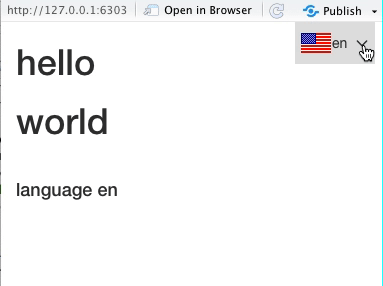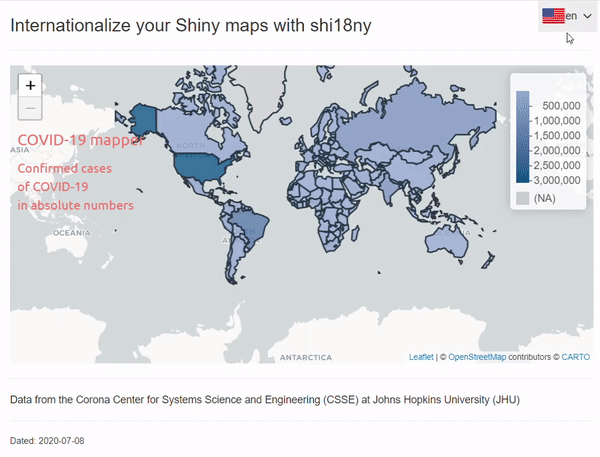Shiny apps internationalization: same app, multiple languages.
We want to make data science more accessible and more inclusive for those people who don’t speak English as their first language. shi18ny enables you to translate your Shiny apps into 15 (and growing) different languages so that you can reach coders and non-coders around the world with little effort.
Check the full documentation at http://shi18ny.datasketch.dev

Languages
Currently, shi18ny supports the following 15 languages: Arabic, Catalan, Chinese, Danish, German, English, Spanish, French, Hebrew, Hindi, Italian, Portuguese, Portuguese (Brazil), Russian, and Swedish.
If the language you’re looking for is not yet available, see the vignette("contributing") on how you can help us improve and extend the selection languages.
Installation
You can install the development version from GitHub with:
# install.packages("devtools")
devtools::install_github("datasketch/shi18ny")For more installation advice, for example if you want to contribute to the package, see the vignette("getting-started") guide.
Your first multilanguage shiny app
Here is a basic example which shows you how to use shi18ny in a basic Shiny app.
if (interactive()) {
library("shiny")
library("shi18ny")
ui <- fluidPage(
tags$h1("shiny internationalization"),
br(),
# Initialize shi18ny
useShi18ny(),
# Language selector input
langSelectorInput("lang", position = "fixed"),
# UI elements
# Text can be translated directly from the UI, using the ui_ function:
h1(ui_("hello")),
# OR by using uiOutput:
uiOutput("results")
)
server <- function(input, output, session) {
# Configure shi18ny
i18n <- list(
defaultLang = "en",
availableLangs = c("es", "en", "pt")
)
# Call language module to get currently selected language and save it in a reactive
lang <- callModule(langSelector, "lang", i18n = i18n, showSelector = TRUE)
# Update UI translation
observeEvent(lang(),{
uiLangUpdate(input$shi18ny_ui_classes, lang())
})
# Render translations by passing the text and the active (selected) language as the lang() parameter to the i_ function
output$results <- renderUI({
list(
h1(i_("world", lang())),
br(),
h4(i_("language", lang()))
)
})
}
shinyApp(ui, server)
}More examples
You can find more examples by running shi18ny::runExample() after installing the package. This will show you the names of the examples that are available.
For example, you can run shi18ny::runExample("ex06-translate_covid_viz") to see how shi18ny can be used to translate a map of the world showing confirmed cases of COVID-19 by country (as of 08/07/20).

Roadmap
We are always looking to improve shi18ny to further promote the internationalization of data science. Here are some improvements/features we have on our list for upcoming releases. If you have any other suggestions for new features, please let us know by filing an issue as a ‘feature request’ on our GitHub page (see vignette("contributing") for details).
- Support RTL languages properly
- Add locale formatting for dates
- …
Other internationalization packages
If you’re interested in other R packages around the topic of internationalization in R, have a look at the following GitHub pages:
- shiny.i18n (for more Shiny internationalization)
- traduire (for translations outside of Shiny apps)
- i18n (to get localized variants of dates, times, and currencies)
- d3.format (to format numbers for human consumption)
FAQ
I’ve spotted a bug, how can I report it?
If you’ve come across issues with the package, we’d greatly appreciate if you could file an issue on our GitHub page. See the vignette("contributing") guide on how to go about that.
My language is not yet supported, what can I do to help?
If you are looking to translate your Shiny app into a language that doesn’t yet exist in shi18ny you can either make a feature request for this language on our GitHub page or help us add this language to the dictionary. In the vignette("contributing") we take you through the steps.
My language exists but doesn’t recognize certain words, how can I solve this?
If the language you are using for your translation is supported by shi18ny but there are certain words that aren’t translated (or that aren’t translated correctly) you can help by filing this as an issue or by helping us improve the dictionary yourself. The vignette("contributing") talks you through either of these options.
Acknowledgements
Flags from
Country Flags taken from https://github.com/hjnilsson/country-flags Catalonia flag from wikipedia
